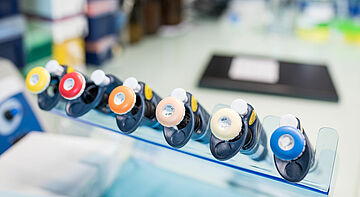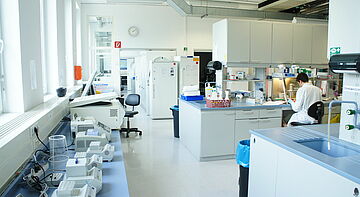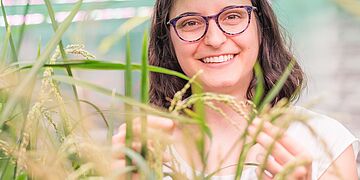Researchers at the Vienna BioCenter and in Ghana team up to advance diagnostics in Africa

LAMP as a low-cost, low-resource diagnostics tool
Following its successful implementation for SARS-CoV-2 detection by Vienna BioCenter scientists, LAMP now shines a light on malaria and schistosomiasis in Africa. The technique’s low cost, ease of use, and high versatility could help African researchers apply it locally to high-priority infectious diseases and overcome international supply chain bottlenecks.
In early 2020, Vienna BioCenter scientists were among the first to react to the rampant COVID-19 public health threats: they harnessed the diagnostics tool RT-LAMP (reverse transcription LAMP, or loop-mediated isothermal amplification) for the detection of SARS-CoV-2. LAMP is an established laboratory assay that a team around Andrea Pauli, Senior Group Leader at the Research Institute of Molecular Pathology (IMP), and Julius Brennecke, Senior Scientist at the Institute of Molecular Biotechnology (IMBA) of the Austrian Academy of Sciences, adapted to a fast, cheap, and user-friendly tool to detect SARS-CoV-2 infections. The researchers demonstrated that LAMP can be used to detect COVID-19 infections with high sensitivity and specificity, but with considerably lower costs, fewer reagents, and more quickly than PCR. In 2021 and 2022, with great help from Lucia Prieto-Godino and Thomas Auer from TReND in Africa, the team established a network of collaborators in Africa to test their methods beyond a controlled laboratory environment, paving the way for more accessible and efficient diagnostics. Scientists from Ghana, Cameroon, and Nigeria participated in the project and supported each other to implement LAMP in their home institutions.
Boosting diagnostics in rural Ghana
Little did they know that the method would gain enough momentum to be applied to other infectious diseases in the field. Last April, Andrea Pauli, Max Kellner (PhD student at IMBA), and Martin Matl (former research technician at the IMP/IMBA) traveled to Ghana to accomplish one of the main missions of the VW grant: to make LAMP a non-commercial platform that is self-sustainable and adaptable to malaria, a mosquito-borne infection, and to schistosomiasis, a disease caused by a parasitic worm found in contaminated freshwater. “COVID-19 is only one of many infections that rural populations in sub-Saharan Africa face daily. Other, more dangerous and endemic diseases have – and had – a much higher priority in African countries, even during the pandemic,” says Andrea Pauli.
During the first week of their visit, the scientists tested the LAMP method at the West African Centre for Cell Biology of Infectious Pathogens (WACCBIP) in Accra. Once the assay was confirmed to work in the lab, they embarked on their field trip to the remote community of Edugyaa near Twifo Praso in rural Ghana, which shows a high incidence of malaria infections. Before any testing could start on-site, the Vienna BioCenter and WACCBIP scientists made sure to involve elders of the local community in their endeavors with the help of an interpreter. The endorsement of these respected community leaders was a crucial step to encourage the villagers to take part in the testing campaign. The researchers then offered to collect blood samples for testing, and a range of individuals responded to the call, from the leading member of the community herself to entire classes of the local school, and young parents and their children. The scientists compared the results of LAMP tests to rapid antigen tests on site, and to quantitative PCR tests later on in the laboratory.
The results were compelling: “Making LAMP work in such difficult conditions – and testing for other, more relevant infections – was way beyond my expectations for this project. It’s a dream come true, and I can’t wait to see our collaborators in Ghana take it to the next level,” says Pauli.
The visit was organized in collaboration with scientists from WACCBIP. Felix Ansah, now a postdoctoral researcher there, was the coordinator of the trip and has worked to adapt LAMP to diagnose malaria and Schistosoma infections for years. While Andrea Pauli, Max Kellner, and Martin Matl are back to their own research projects in Europe, Ansah will continue his work with LAMP on-site.
“We’re glad that the LAMP project is contributing to making researchers in African countries more independent of European and North American companies. We were astonished to learn that it takes researchers in Ghana three to six months to receive ordered materials from international suppliers,” says Max Kellner. “Our team effort shows how impactful cross-continental collaborations can be. We've all learned a lot, and we hope that this initiative will serve as a role model for other African countries to set up their own independent diagnostics strategies,” he says.
Talents for Future: Vienna to Accra, Accra to Vienna
The Vienna-based researchers have come back with the burning motivation to raise awareness in the Vienna BioCenter community about the difficulties of research in low- and middle-income countries. As a follow-up to their experience, they hope to establish training collaborations between Vienna and institutions with fewer resources.
As a first step, the Talents for Future program of the Vienna BioCenter Summer School builds bridges between Vienna and low-income countries in Africa, Latin America, and Asia. In 2023, in addition to one student from Costa Rica and another from Peru, three Ghanaian students joined the program for an intensive research stay.
Sarah Ashitei finished her undergraduate studies in biomedical engineering and completed her national service at WACCBIP as a researcher. She joined the Summer School in the lab of Andrea Pauli. Under the supervision of postdoc Victoria Deneke, she investigated interactions between proteins that affect fertilization in zebrafish.
“I’ve found the atmosphere at the Vienna BioCenter to be very welcoming and friendly. You can walk up to anybody, and ask any questions, and they’ll help you out,” she says.
Victor Kornu finished his undergraduate studies at the University of Ghana and also fulfilled his national service at WACCBIP. He has a strong interest in infectious diseases, particularly malaria. He was hosted at IMBA in the lab of Josef Penninger, supervised by PhD student Max Kellner, and studied liver organoids and hepatocytes and their reaction to Plasmodium infections.
“The research environment is mind-blowing here. I’ve met so many goal-oriented people – and they have the means to keep up that mindset,” says Kornu. “In the beginning, it was overwhelming to see all this top science every day. But as weeks went by, I learned more and more, and the more I learned, the more I wanted to learn.”
Martin Asare finished his undergraduate studies in biotechnology and molecular biology and completed his national service at the Noguchi Memorial Institute for Medical Research. He joined the lab of Elly Tanaka at the IMP to study tail regeneration in the axolotl, supervised by postdoc Wouter Masselink.
“In our labs, we have to be very careful not to waste our reagents: we need to get it right the first time, which puts a lot of pressure on each experiment. Ordering primers in Vienna takes two days, in Ghana it can take months,” says Martin Asare. “The resources at the Vienna BioCenter allow students to make mistakes and learn without that fear hovering over their heads.”
Apart from the scientific opportunities, the students praised the Vienna BioCenter for its social gatherings, and the city as a whole for its cultural offer and efficient transport system. Their direct supervisors, pleased with the experience, feel inspired to keep developing the Talents for Future program.
“In Ghana, these students could only do research that was available to them, whereas here we have the chance and the resources to research what we want and follow our curiosity. This is something many privileged researchers take for granted,” says Max Kellner.
“The challenge with this program is mainly logistics: getting Ghanaian nationals to Austria was a hassle, but I’m so glad we managed,” says Wouter Masselink. “I really hope we can make this experience count for these students’ future. Their applications to other programs will definitely be stronger after this experience.”
“Although visa procedures made it very difficult for these students to come and turned their Summer School into a Winter School, I really admire their commitment to coming to Vienna and developing their career. They pushed through bureaucratic struggles and had a very successful stay, showing appreciation at every step,” says Victoria Deneke. “The program aims to empower these students in their next scientific endeavors, in Ghana or abroad.”







